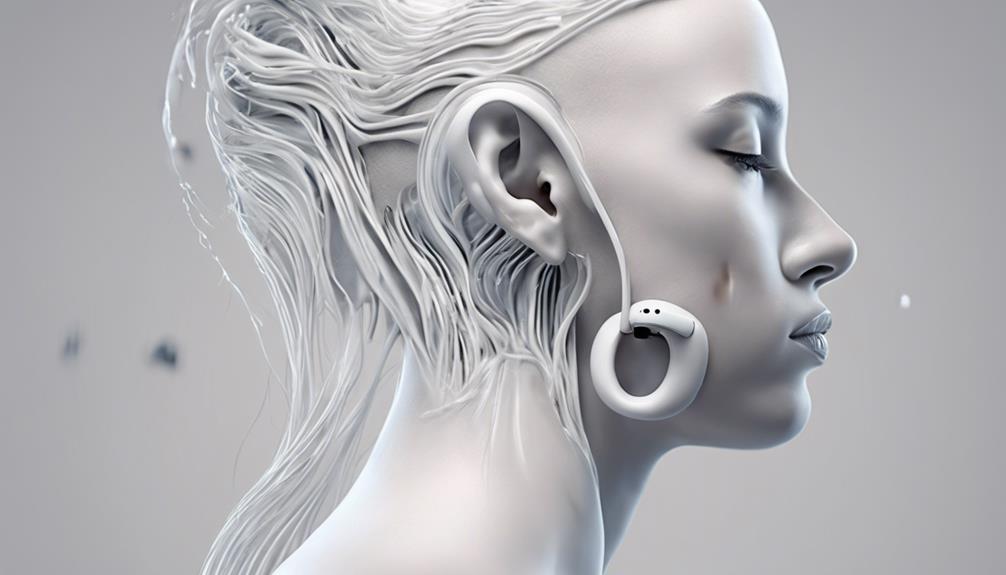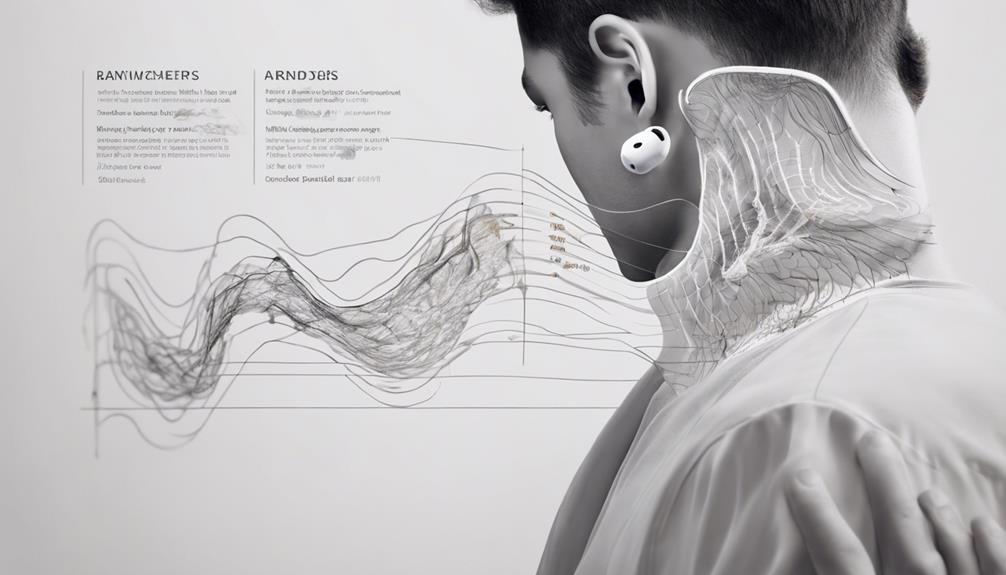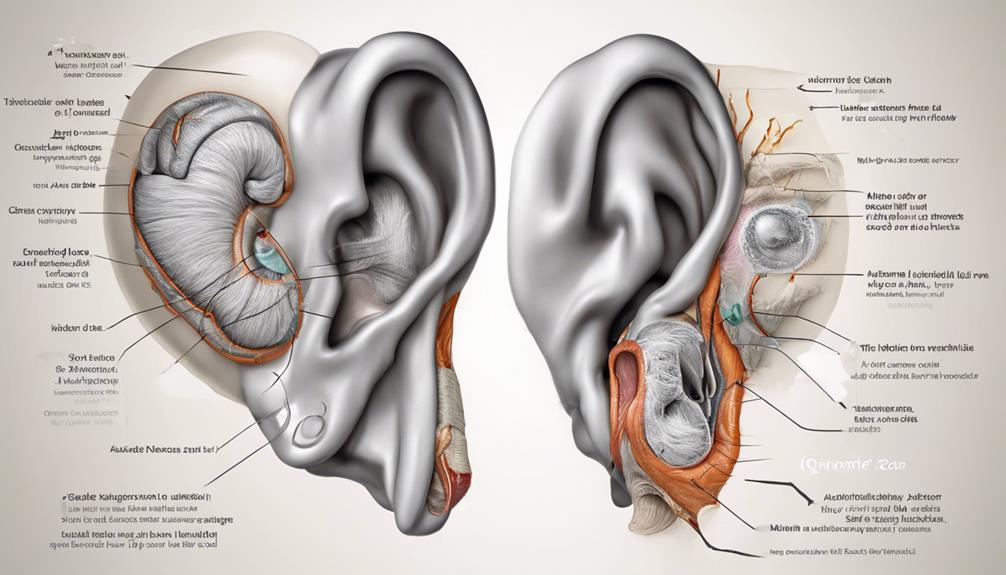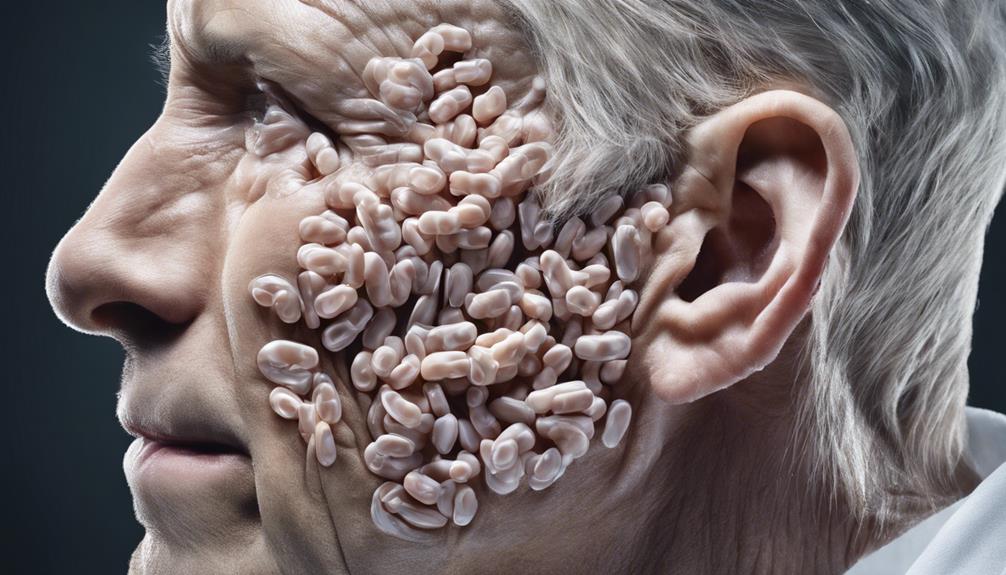When delving into the realm of sound technology, it’s crucial to recognize that AirPods are capable of generating sounds exceeding 100 decibels, a level that has the potential to harm our hearing.
However, understanding the specific mechanisms through which AirPods contribute to hearing loss provides valuable insight into safeguarding our auditory health.
By exploring the intricate relationship between AirPods and our ears, we can uncover essential strategies to mitigate the risk of hearing damage and ensure our long-term well-being.
Key Takeaways
- Prolonged high-volume use of AirPods can lead to irreversible hearing damage.
- Monitoring volume levels and taking breaks is crucial to prevent ear harm.
- Improper AirPods use can increase the risk of ear infections and inner ear issues.
- Adhering to safe listening practices and recommended usage limits is vital for ear health.
Potential Hearing Damage From Airpods
Prolonged exposure to high volumes from AirPods poses a significant risk of permanent hearing loss, emphasizing the importance of mindful volume control and regular breaks to safeguard inner ear health.
The delicate structures within our ears are susceptible to damage when subjected to loud sounds for extended periods. AirPods, when used at high volumes, can transmit sound waves directly into the ear canal, potentially causing harm to the sensitive hair cells responsible for converting sound vibrations into electrical signals for the brain to interpret. This continuous bombardment of loud noises can lead to irreversible hearing loss over time.
It is crucial to recognize that the inner ear is a complex system that requires care and attention. By listening at excessive volumes through AirPods without breaks, individuals can unknowingly subject their ears to stress and strain, making them more vulnerable to long-term damage.
To maintain healthy hearing, it's essential to practice safe listening habits, including moderating volume levels and taking regular pauses during extended listening sessions to allow the ears to rest and recover. By being mindful of these factors, individuals can better protect their inner ear health and reduce the risk of potential hearing damage associated with AirPods usage.
Factors Contributing to Hearing Loss

What factors contribute to hearing loss when using AirPods? When it comes to the risk of hearing damage, several key elements play a significant role. One crucial factor is the loud decibel levels that AirPods can reach, exceeding 100 dB, which is considered harmful to our ears. Additionally, improper use, such as listening at high volumes for extended periods, can lead to prolonged exposure and increase the likelihood of hearing loss. Studies have shown that individuals wearing earbuds tend to listen at higher volumes compared to those using over-ear headphones, further elevating the risk of potential damage to their hearing.
To provide a clearer visual representation, let's examine the factors contributing to hearing loss when using AirPods in the table below:
| Factors | Impact on Hearing Loss |
|---|---|
| Loud Decibel Levels | Exceeding 100 dB can be harmful to hearing. |
| Improper Use | Listening at high volumes for extended periods can lead to prolonged exposure and increase the risk of hearing loss. |
| Earbud Usage | Users tend to listen at higher volumes compared to over-ear headphones, raising the risk of potential damage. |
Impact of AirPods on Ear Health
When considering the impact of AirPods on ear health, it becomes evident that maintaining safe listening practices is paramount to prevent potential hearing damage. Here are key points to bear in mind:
- Volume Can Damage: High volumes from AirPods can lead to hearing loss over time.
- Prolonged Exposure to Loud: Extended periods of listening at high volumes can harm the delicate structures in the ear.
- Excessive Use: Using AirPods excessively may heighten the risk of ear infections due to prolonged exposure.
- Monitoring Volume Levels: Regularly checking and adjusting the volume levels can help protect your ears from damage.
To ensure healthy listening and safeguard your ear health, it's crucial to be mindful of these factors. Remember to take regular breaks, keep volume levels in check, and prioritize your ear health when using AirPods.
Tips for Preventing Hearing Damage

To safeguard our hearing health while using AirPods, adhering to recommended usage limits and taking regular breaks is essential to prevent potential damage.
Loud noises can cause permanent hearing loss, making it crucial to be mindful of our listening habits. Limiting AirPod usage to one hour daily, as suggested by the World Health Organization, can help reduce the risk of overexposure to noise levels that may harm our auditory nerve.
It's also important to take breaks from extended periods of AirPods use to allow our ears to rest and recover. Avoiding noisy environments can lower the need for higher volume levels, further protecting our hearing. Consider opting for over-the-ear headphones or volume-limiting alternatives to AirPods, especially in situations with background noise.
Setting notifications and alerts on AirPods to half volume can mitigate the potential harm sudden loud sounds may pose to our ears. By incorporating these tips into our listening routine, we can better preserve our hearing health.
Understanding Ear Safety With Airpods
As we explore the realm of AirPods and their impact on ear safety, it's crucial to understand the potential risks associated with prolonged usage of these popular wireless earphones.
- Proper Fit: Ensuring a good fit is essential to prevent discomfort and reduce the risk of damage to the inner ear.
- Volume Levels: The high volumes exceeding 100 dB that AirPods can reach pose a significant risk of hearing damage over time.
- Inner Ear Health: The design flaw of creating a seal around the ear canal with AirPods may increase susceptibility to ear infections and impact inner ear health.
- Bluetooth Technology: The Bluetooth technology in AirPods emits electromagnetic radiation, raising concerns about its effects on the inner ear.
Understanding how AirPods interact with our ears is crucial in maintaining ear safety. By paying attention to fit, volume levels, inner ear health, and the technology involved, we can better protect our hearing and overall ear health while enjoying the convenience of wireless audio.
Frequently Asked Questions
Do Airpods Contribute to Hearing Loss?
Yes, AirPods can contribute to hearing loss due to their ability to produce high volumes that exceed 100 dB. Prolonged exposure without volume control can lead to gradual damage.
Studies indicate that earbud users often listen at elevated levels. This habit, combined with excessive AirPods usage, increases the risk of ear infections and tinnitus.
It's crucial to be mindful of volume levels to protect our hearing health.
What Happens if You Wear Airpods for Too Long?
If we wear AirPods for too long, our auditory system can suffer adverse effects. Prolonged usage may lead to fatigue and strain on the delicate inner ear structures, possibly causing temporary or permanent hearing issues.
Symptoms like tinnitus, a ringing sensation, might indicate damage. Taking breaks and limiting AirPods use can prevent long-term consequences on our hearing health. It's crucial to balance enjoyment with safeguarding our ears against potential harm.
Do Airpods Make Tinnitus Worse?
Yes, AirPods can make tinnitus worse. Prolonged exposure to high volumes from AirPods can exacerbate tinnitus symptoms like ringing in the ears. Monitoring usage and volume levels is crucial to prevent tinnitus worsening.
Tinnitus sufferers must be cautious with AirPods to avoid aggravating their condition. Taking breaks and adjusting volume levels can help manage tinnitus discomfort while using AirPods.
Is There a Lawsuit Against Airpods?
Yes, there are lawsuits against AirPods alleging insufficient warnings about potential hearing loss risks. Plaintiffs claim Apple didn't provide clear information on safe listening practices, leading to damages.
These legal actions underscore the necessity of clear guidelines for safe headphone use. It's crucial for companies to prioritize consumer safety and provide adequate warnings to prevent potential harm.
Conclusion
In conclusion, the potential for hearing damage from AirPods is a serious concern that shouldn't be taken lightly. By understanding the factors contributing to hearing loss and implementing preventative measures, we can protect our ear health and preserve our ability to hear.
Stay tuned for our upcoming tips on how to safely use AirPods without risking long-term damage to your hearing. Your ears deserve the best care possible!











